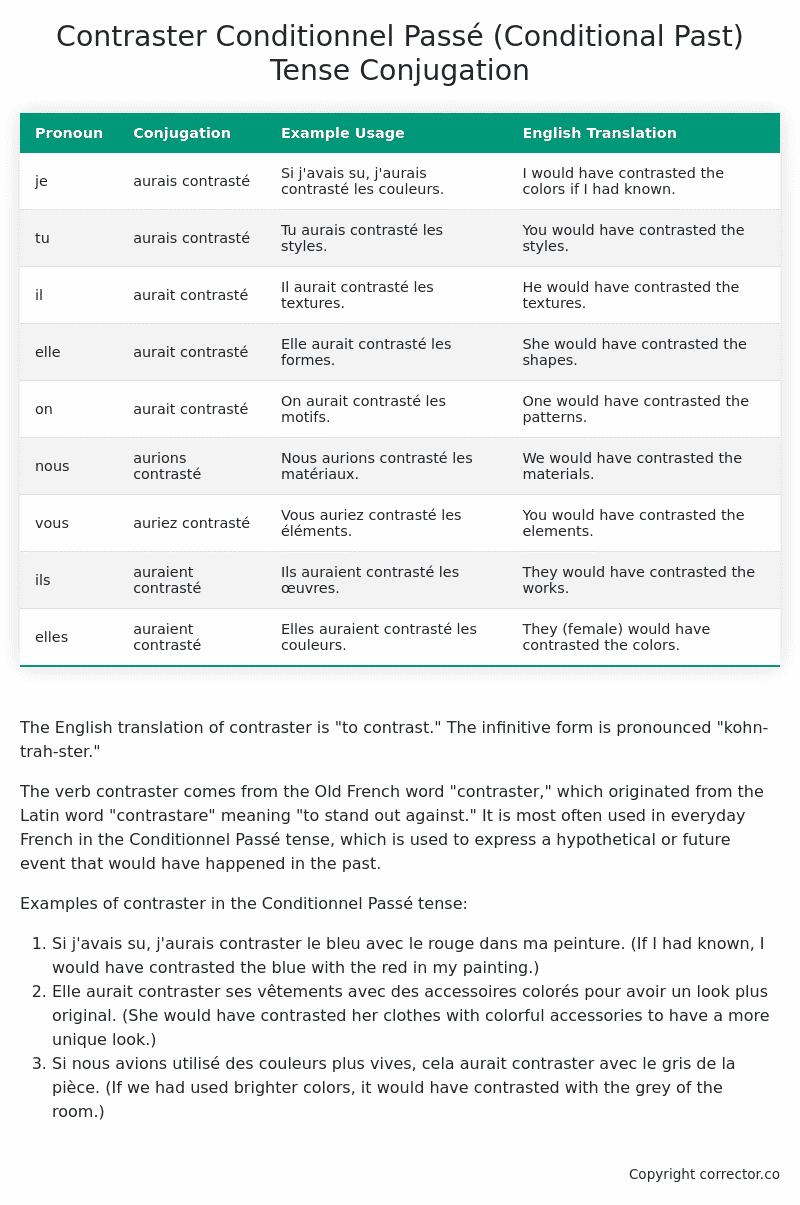Conditionnel Passé (Conditional Past) Tense Conjugation of the French Verb contraster
Introduction to the verb contraster
The English translation of contraster is “to contrast.” The infinitive form is pronounced “kohn-trah-ster.”
The verb contraster comes from the Old French word “contraster,” which originated from the Latin word “contrastare” meaning “to stand out against.” It is most often used in everyday French in the Conditionnel Passé tense, which is used to express a hypothetical or future event that would have happened in the past.
Examples of contraster in the Conditionnel Passé tense:
- Si j’avais su, j’aurais contraster le bleu avec le rouge dans ma peinture. (If I had known, I would have contrasted the blue with the red in my painting.)
- Elle aurait contraster ses vêtements avec des accessoires colorés pour avoir un look plus original. (She would have contrasted her clothes with colorful accessories to have a more unique look.)
- Si nous avions utilisé des couleurs plus vives, cela aurait contraster avec le gris de la pièce. (If we had used brighter colors, it would have contrasted with the grey of the room.)
Table of the Conditionnel Passé (Conditional Past) Tense Conjugation of contraster
| Pronoun | Conjugation | Example Usage | English Translation |
|---|---|---|---|
| je | aurais contrasté | Si j’avais su, j’aurais contrasté les couleurs. | I would have contrasted the colors if I had known. |
| tu | aurais contrasté | Tu aurais contrasté les styles. | You would have contrasted the styles. |
| il | aurait contrasté | Il aurait contrasté les textures. | He would have contrasted the textures. |
| elle | aurait contrasté | Elle aurait contrasté les formes. | She would have contrasted the shapes. |
| on | aurait contrasté | On aurait contrasté les motifs. | One would have contrasted the patterns. |
| nous | aurions contrasté | Nous aurions contrasté les matériaux. | We would have contrasted the materials. |
| vous | auriez contrasté | Vous auriez contrasté les éléments. | You would have contrasted the elements. |
| ils | auraient contrasté | Ils auraient contrasté les œuvres. | They would have contrasted the works. |
| elles | auraient contrasté | Elles auraient contrasté les couleurs. | They (female) would have contrasted the colors. |
Other Conjugations for Contraster.
Le Present (Present Tense) Conjugation of the French Verb contraster
Imparfait (Imperfect) Tense Conjugation of the French Verb contraster
Passé Simple (Simple Past) Tense Conjugation of the French Verb contraster
Passé Composé (Present Perfect) Tense Conjugation of the French Verb contraster
Futur Simple (Simple Future) Tense Conjugation of the French Verb contraster
Futur Proche (Near Future) Tense Conjugation of the French Verb contraster
Plus-que-parfait (Pluperfect) Tense Conjugation of the French Verb contraster
Passé Antérieur (Past Anterior) Tense Conjugation of the French Verb contraster
Futur Antérieur (Future Anterior) Tense Conjugation of the French Verb contraster
Subjonctif Présent (Subjunctive Present) Tense Conjugation of the French Verb contraster
Subjonctif Passé (Subjunctive Past) Tense Conjugation of the French Verb contraster
Subjonctif Imparfait (Subjunctive Imperfect) Tense Conjugation of the French Verb contraster
Subjonctif Plus-que-parfait (Subjunctive Pluperfect) Tense Conjugation of the French Verb contraster
Conditionnel Présent (Conditional Present) Tense Conjugation of the French Verb contraster
Conditionnel Passé (Conditional Past) Tense Conjugation of the French Verb contraster (this article)
L’impératif Présent (Imperative Present) Tense Conjugation of the French Verb contraster
L’infinitif Présent (Infinitive Present) Tense Conjugation of the French Verb contraster
Struggling with French verbs or the language in general? Why not use our free French Grammar Checker – no registration required!
Get a FREE Download Study Sheet of this Conjugation 🔥
Simply right click the image below, click “save image” and get your free reference for the contraster Conditionnel Passé tense conjugation!

Contraster – About the French Conditionnel Passé (Conditional Past) Tense
Formation
Common Everyday Usage Patterns
Expressing Unreal Past Scenarios
Polite Requests or Suggestions
Expressing Doubt or Uncertainty
Interactions with Other Tenses
Conditional Present
Indicative Past Tenses
Conditional Future
Summary
Want More?
I hope you enjoyed this article on the verb contraster. Still in a learning mood? Check out another TOTALLY random French verb conjugation!


